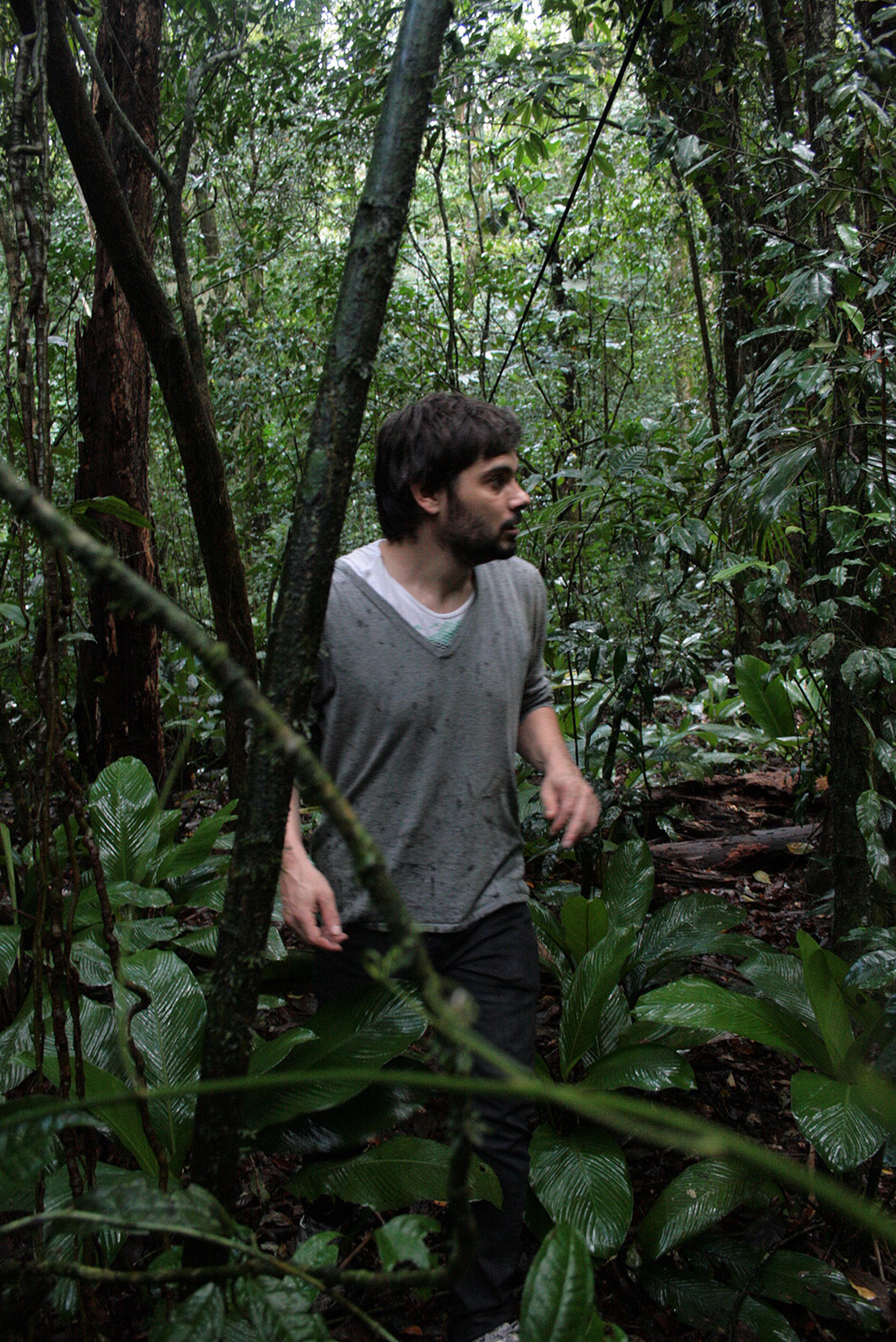
Daniel Steegmann Mangrané
Mendes Wood DM is pleased to announce La Pensée Férale, by Daniel Steegmann Mangrané. Conceived as a two-part presentation, two solo exhibitions by the artist will take place in Paris concurrently, at Mendes Wood DM and Esther Schipper.
A cornerstone of both exhibitions are works transposing the eye of a dog onto a tree, whether as part of a landscape or a sculptural object made from tree bark, emphasizing a mutually transforming game of gazes, a perspectivist entanglement of looking and being looked at. La Pensée Férale then continues Steegmann Mangrané’s exploration of the complex relation of beings with their surroundings experienced for example in the Mata Atlântica. To the artist, the conditions of such rainforest environments are indicative of an entirely different mode of existence, a way of being in the world that is represented in the distinct cosmologies of Amerindian peoples and that shapes distinct notions of perspective, subjectivity, and agency. Finding poetic expressions and vivid representations of a living, soulful nature in delicate modified organic materials such as leaves, twigs, or fruits, in photography and film, the two-part presentation gives an overview of Steegmann Mangrané’s recent work. A comprehensive survey of the artist’s practice, Daniel Steegmann Mangrané: A Leaf Shapes the Eye, is on view at MACBA in Barcelona through May 20, 2024.
At Mendes Wood DM eyes embedded in large sections of oak bark stare at visitors from different heights as they ascend the stairs. The sections belong to a more than 300-year-old oak that recently died of the severe drought from which Catalunya is suffering. The changing climate has altered rainfall and temperature patterns, allowing for invasive species to thrive and fostering plagues, such as the xylophagous bark beetle, endangering forests and stressing flora and fauna. The disembodied eyes of dogs that recur in these sculptural works, emphasize once again the notion of a natural world that is itself feeling, perceiving, and in a constant dialogue with its inhabitants. A series of holographic works, akin to a small terrarium or the display cases at a museum of natural history, create a small tableaux vivant of twigs, geometric shapes, and, in some cases, insects and a human presence. As one peers “into” the depicted space, trying to decipher what one is seeing, the arbitrariness of the distinction made between organic and human-made forms becomes apparent.
The interlacing of life is at the root of the new sculptures Tangled Leaves on view in the following room. A play on words, namely the close homophony of tangled lives, the sculptures stand for the interconnectedness of all beings, in this show metaphorically represented by the image of the leaf. In the last room, but spreading its soundtrack across the entire exhibition, a new video work shows a surrealist erotic image: an eye, seen underwater, surrounded by tadpoles. The combination of stillness and animation, of an eye invaded/surrounded by small beings speaks eloquently both to fundamental fears but also to the far-reaching effects of ecological change. The soundtrack, composed by the renowned cellist Franziska Aigner, enhances the eeriness of the imagery with its suspenseful staccato.
At Esther Schipper, a series of seven photographs punctuate the exhibition space. The photographs were taken at the Tijuca National Park, a Mata Atlântica rainforest in Rio de Janeiro. Once almost entirely depleted, the Brazilian Emperor Dom Pedro II in the mid-19th century nationalized the land and had a group of enslaved men replant the rainforest, in what was probably one of the pioneering governmental ecological actions worldwide. Almost entirely cut down, Tijuca still hosts some trees older than 600 years. Those giants were already in place when the Portuguese first arrived and have witnessed, in its entirety, the violent process of colonization. In Steegmann Mangrané’s works, the trees have come to stare back at us with the disembodied eyes of feral dogs.
The photographs are accompanied by short texts by the philosopher Juliana Fausto, who explores the history of this place from the point of view of the feral dogs that inhabit the forest today, and who ponders what “feral thought” might be. Drawing upon, but diverting in important ways, from French anthropologist Claude Levi-Strauss’ notion of la pensée sauvage which postulated the possibility of a primordial thought, untamed by (Western) civilization, Fausto imagines what our tamed thought would become if we were ever to break the chains of domestication, to decolonize and set our thought free. It won’t be a pensée sauvage, as described by Levi-Strauss, but it may become a feral thought, according to Fausto.
Alongside the photographs, delicate branches are suspended from the ceiling and presented on plinths. The different sculptures are made from split twigs or branches bisected, sometimes intertwining the two parts, as if mirrored. The graceful sculptures take on an embodied, perhaps even anthropomorphic quality, suggesting a sense of both fragility and resilience.
Mendes Wood DM Paris
25 place des Vosges, 75004 Paris
Steegmann portrait ©Amilcar Packer